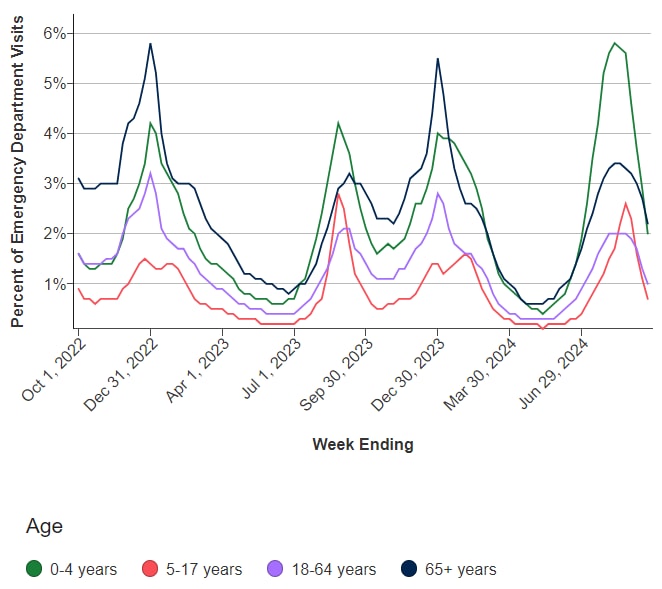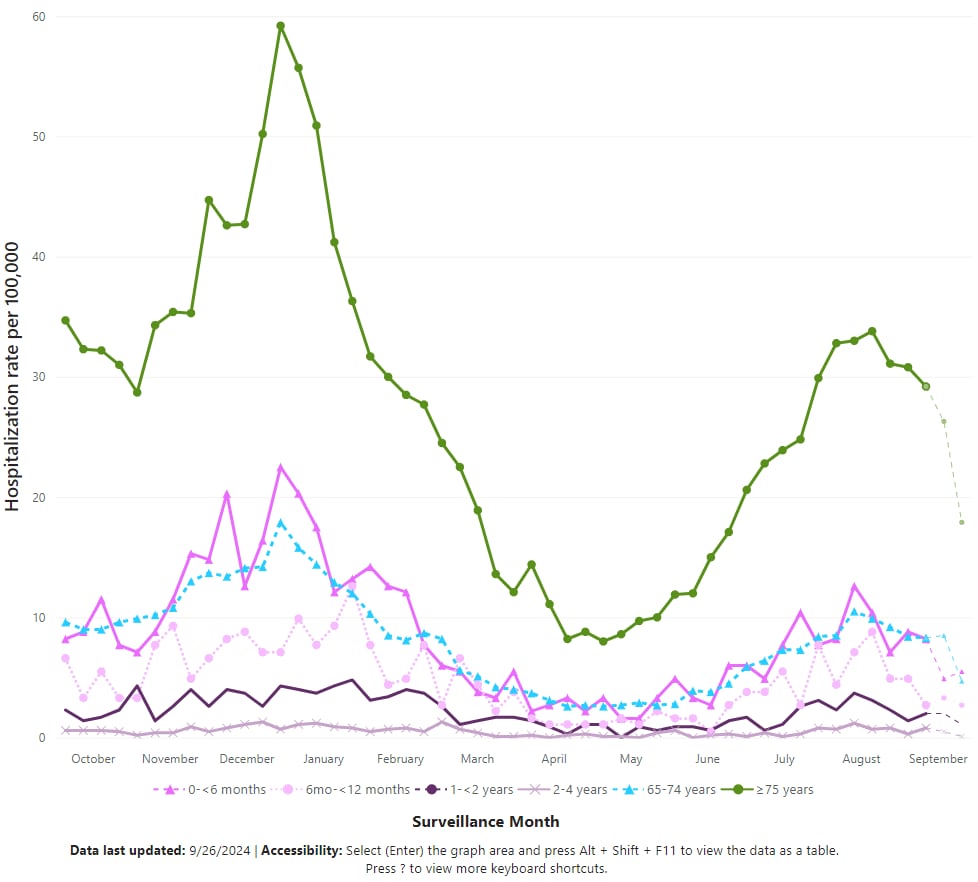What to know
- Infants younger than 6 months of age and children with one or more underlying medical conditions are at higher risk of severe COVID-19 disease.
- COVID-19 vaccination during pregnancy can help protect infants after birth and is recommended for all pregnant people year-round.
- Children aged 6 months to 4 years are recommended to receive a multidose initial COVID-19 vaccination series. This is especially important for children with underlying medical conditions.

Summary
What CDC Knows
Indicators of COVID-19 activity, including COVID-19 test positivity, emergency department visits and rates of COVID-19 hospitalizations, increased this summer. During the week ending August 10, 2024, 5.8% of emergency department visits among children younger than 5 years of age were due to COVID-19. While emergency department visits and hospitalizations have started to decline in recent weeks, they are still elevated across the United States.
What CDC is doing
CDC uses surveillance systems year-round to monitor multiple respiratory viruses. CDC continues to monitor COVID-19 activity through various sources including lab test positivity, emergency department visits and hospitalizations. This surveillance helps to identify trends and patterns of disease spread. CDC promotes vaccination by educating health care providers and the public and supporting vaccine purchase through the Vaccines for Children program.
A higher proportion of young children are visiting emergency departments for COVID-19
As SARS-CoV-2 circulation increased this summer, emergency department visits due to COVID-19 increased in all ages, including among infants and young children. During the week ending August 10, 2024, 5.8% of emergency department visits among children younger than 5 years of age were due to COVID-19. This represents a higher proportion of visits due to COVID-19 than any other age group.
While most children experience asymptomatic, mild, or moderate COVID-19 illness, some children can experience severe illness. Severe illness can result in admission to the hospital, and in some cases, the use of mechanical ventilation, a type of breathing machine. Infants younger than 6 months of age and children with one or more underlying medical conditions are at higher risk of severe COVID-19 disease.
COVID-19 Associated Emergency Department Visits by Age

Among children, infants less than 6 months of age are at highest risk of COVID-19-associated hospitalization
As observed during previous periods of increased SARS-CoV-2 circulation, COVID-19 hospitalization rates for children younger than 5 years of age increased from June to August, with the highest pediatric rates in infants less than 6 months. These COVID-19 hospitalization rates follow trends over the last three years, which have consistently demonstrated higher hospitalization rates among infants younger than 6 months of age than in any other pediatric age group and comparable to rates in adults ages 65 years and older.
For the week ending August 10, 2024, some of the highest rates of COVID-19 associated hospitalization rates continue to be in older adults aged 75 years and older (32.8 per 100,000). Among children, infants younger than six months of age had the highest rate (12.6 per 100,000) of hospitalizations associated with COVID-19.
Weekly Rates of COVID-19 Associated Hospitalizations by Age Group, 2023-24

Although infants younger than 6 months of age are the pediatric age group with the highest rates of hospitalization, they are not eligible to receive the COVID-19 vaccine. Research suggests that COVID-19 vaccination during pregnancy can protect infants after birth and is recommended for all pregnant people year-round.
As of September 7, 2024, children 6 months to 11 months of age have the second-highest pediatric hospitalization rates (2.7 per 100,000). When compared to older children, this hospitalization rate underscores the importance of starting a multidose initial COVID-19 vaccination series once a child is eligible at 6 months of age.
COVID-19 hospitalizations and severe outcomes from COVID-19 are also more common in children older than 4 years of age with underlying medical conditions. Routine COVID-19 vaccination in school-aged children with underlying medical conditions can help protect them from severe outcomes.
COVID-19 vaccination rates among pregnant and young children are low
Vaccinating pregnant people and children 6 months or older can protect newborns and young children against the more severe outcomes of COVID-19. As of May 11, 2024, only 13.3% of pregnant persons ages 18-49 years had received an updated 2023-24 COVID-19 vaccine, and just under 6% of children ages 6 months to 4 years were up to date with their COVID-19 vaccine. This means that many young children are left unprotected from the most severe impacts of COVID-19.
CDC recommends everyone ages 6 months and older receive an updated 2024-2025 COVID-19 vaccine to protect against the potentially serious outcomes of COVID-19. Vaccination is particularly important for children with underlying medical conditions that put them at higher risk for severe COVID-19, such as prematurity, chronic lung disease, heart disease, and neurological disorders.
